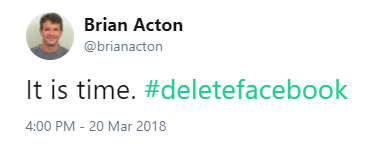
Cairo 360
Since the 2010 Revolution, Facebook has blown up in terms of popularity in Egypt. Older adults grew a curious bone, driving them to flood Facebook with their very own unique style of social networking; weird greeting pictures, Kermit the Frog Arabic jokes, and all that. Currently, Egypt is home to a whopping 35 million Facebook users, the largest in Africa by far, with the second being Algeria with 19 million. This is exactly why we have decided to bring this story to Egyptians.
A certain disclaimer line in the rules and regulations that we accept, but never read, has always forewarned us of a dark secret; yet, most of us were none the wiser. The line states, in various ways, that the website owns some of our private information, and in some form or another, will use it to benefit third parties.
We all understand how Facebook uses our personal data to customize user experience. Its main target is to personalize ads so that you see what you want, and their client, the advertiser, reaches his target audience more effectively. Things get a bit more invasive when you see ads of things you just googled, or those that are similar to it. And it gets creepy when you find Friend Suggestions of a person that you just met today, after you were both located in the same place.
Things blew up in the face of Facebook after Brian Acton, WhatsApp co-founder, urged people on his Twitter account to delete Facebook. His message was very simple and cryptic, he only stated, “It is time. #deletefacebook.”

So what did happen? As BBC reports, in 2014, a quiz was created to help people find out their personality type. Just one of those fun quizzes we all participate in. Aleksandr Kogan, an academic from the University of Cambridge, had designed an app associated with the quiz. As was common at the time, the app was able to harvest data of quizzers and their friends as well. Since then Facebook has placed regulations to limit such acts.
Christopher Wylie, who worked with Cambridge Analytica, claims that from 270,000 quizzers, Cambridge Analytica was able to collect the data of about 50 million users. He also alleges that Cambridge Analytica used the data in Trump’s 2016 elections, and benefited financially from that service.
Of course, Facebook & Cambridge Analytica have denied all those allegations. Facebook stated that the app was shut down and that the data was deleted, once they learned of that breach, while Cambridge Analytica confirms that it obeyed Facebook’s request to delete the data.
Statements like these puts Aleksandr Kogan in an unfortunate position, he claims – according to The Guardian – that Facebook and Cambridge Analytica are using him as a scapegoat. He says that Cambridge Analytica were directly involved with this operation and that he was “assured by Cambridge Analytica that everything was perfectly legal and within the limits of the terms of service.”
He denies their claims that he was the one to approach them with the software, and alleges that they used it to create a powerful software program that would help Trump out in the ballot box. Yet, he doubts the actual effectiveness of such a program, since the accuracy of that data was ultimately weak. Kogan regrets his involvement, and says, “One of the great mistakes I did here was that I just didn’t ask enough questions.”
But, at the end of the day, Facebook was breached, and the data of 50 million people was at risk of being exploited. All this lead to Facebook’s stock dropping by 7%, which doesn’t sound like much, but in truth translates to a $37 million loss in value. Zuckerberg has been completely silent on the matter till this moment. A number of US authorities is opening investigations in this matter; this issue is far from over.
While a part of this lack of privacy is beneficial to you as a user, you can’t shake the feeling of intrusion. Technology is ever evolving, and no matter how hard you try to stay up to date, it will beat you. We cannot expect what technology will bring next, but we can help keep our more private information away from easy access. And, with Egypt being home to the aforementioned whooping number of Facebook users, it becomes necessary that Egyptians follow this story well.
recommended
 Restaurants
Restaurants
Cairo's Ramen Revival: 5 Must-Try Bowls Around the City
Asian Food Asian Restaurants Cafés
Cafés



